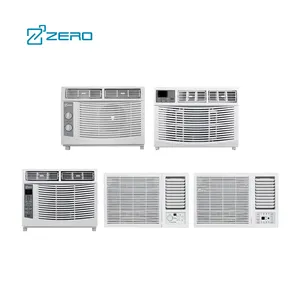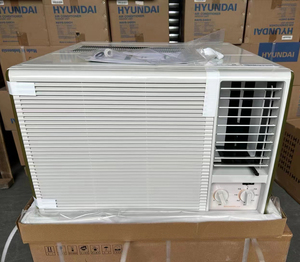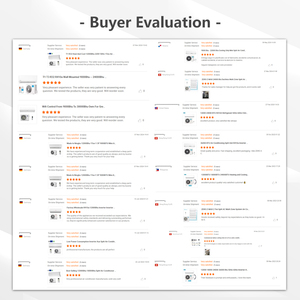(1506 products available)




























































































































































































Window air conditioners come in different models for varying customer preferences and room conditions. The BTU window air conditioner is a popular model that cools several spaces ranging from small to medium-sized. BTU stands for British Thermal Units and is the unit for measuring the cooling capacity of an air conditioning system.
Cooling-only window air conditioner:
This window AC can only cool a space, not heat it. It works by extracting warm air from inside the room and cooling it before releasing the chilled air. The warm air gets redirected outside through the condensed drainage hose. The cooling-only AC is an affordable option for many homeowners. It is ideal for homes in temperate regions where heating indoor spaces is unnecessary.
Heat Pump Window AC:
This air window AC can cool and heat indoor spaces. In cooling mode, the heat pump window AC works like a regular window AC. But when it is in heating mode, the heat from outside gets pumped inside to warm the area. The heat pump model can reduce heating costs, as using electricity to move heat is cheaper than generating heat with electricity. But using the heat pump in extremely cold climates may not be efficient, as there is less outside heat to pump inside.
Reverse Cycle AC:
The reverse cycle AC is similar to the heat pump AC in that it can cool and heat indoor air. Some people may refer to the heat pump AC as the reverse cycle AC. It first extracts the outside air and passes it through condenser coils that have warm refrigerant inside. The warm air then gets blown inside to heat the room.
Window AC with heater:
This window air conditioner cools and heats indoor spaces like the reverse cycle AC. However, the heater-equipped window unit takes the warm outside air in during winter and passes it through condenser coils with warm refrigerant to release warm air inside. Because it uses warm outside air, this heater-window AC is only efficient in slightly cold weather. For extremely cold weather, using the heater may not be efficient, as there is less outside.
Cooling Capacity and BTU Range:
The unit's cooling capacity determines how effectively it can cool a room. This capacity is measured in BTUs (British Thermal Units), which indicates how much heat the air conditioner can remove from the space.
Air conditioners generally have a BTU range between 5,000 and 25,000 BTUs. Simpler models will have lower BTUs, while more advanced devices can have the highest capacity. The higher the number of BTUs, the larger the space the air conditioner can cool. A 5,000 BTU unit could cool a small bedroom, while a 20,000 BTU model could handle a large living room. To choose the right AC, one must consider the size of the room. A unit with too high or low a BTU rating for a room can lead to inconsistent temperatures and waste energy. A guide that matches different BTUs to room sizes can help people select an AC appropriate for their cooling needs.
Energy Efficiency and EER:
To calculate how much energy an air conditioner will use, one needs to look at its Energy Efficiency Ratio, or EER. The EER shows how well a unit can cool while saving electricity. Higher EER numbers mean an AC cools better without wasting power. Choosing a more efficient AC will cost less to run. When looking to buy an air conditioner, people should check its EER rating. Higher EER units are better at conserving electricity as they cool the air. This makes them less expensive when paying for electricity over time. An AC's EER shows how much power it uses to cool the room. The higher the EER, the more efficient it is. Units with higher EERs waste less electricity while cooling, saving money in the long run. The EER helps people choose a more-efficient AC that fits their budget. Considering EER helps Select a Unit that Cools at Low Cost.
Dehumidification and Fan Modes:
BTU window air conditioners help keep a room cool on hot days. They also have a way to take moisture out of the air. Humidity is the dampness felt inside a space when it is too wet. When humidity gets high, it can make the air feel heavy and uncomfortable. The air conditioner has a dehumidification setting. A dehumidification setting removes dampness from the air. It helps make a room feel more comfortable on humid days. The AC will drain condensation collected to keep humidity levels low. Keeping humidity in check makes a room feel cooler without having to lower the temperature a lot. The air conditioner helps maintain a comfortable humidity level. Worrying less about moisture makes hot summer days more pleasant.
Many models also have different fan settings. Multi-speed fans allow one to choose how fast the air blows. A low fan gives soft, quiet air. High fan speeds provide strong airflow. The fan helps circulate air smoothly. Steady, gentle air movement from the fan makes the cool air spread evenly throughout the room. Strong or soft air won't allow any one place to become too cold. The window AC encourages the room to keep a balanced, comfortable temperature.
BTU window air conditioners are perfect for cooling small and medium-sized residential and commercial spaces. Here are some common scenarios where window ACs come in handy:
Home Cooling
There are plenty of places to install a BTU air conditioner for a window in the home:
Room Additions
Window AC units are useful for cooling newly added rooms to homes that have no central air. They offer a simple way to keep these areas pleasant.
Server Rooms
Small server rooms that hold computers and servers need window air conditioners. These keep machines running smoothly by preventing overheating.
Rental Properties
Landlords use window air conditioners to keep tenant rooms cool, especially where there is no central cooling.
In places with hot summers, tenants are kept happy by BTU window air conditioner units installed by landlords.
Seasonal rentals like vacation homes benefit from window ACs. They provide a cost-effective way to offer cooling amenities to guests during high-demand peak times.
Workspaces and Commercial Areas
Small offices and retail shops choose window ACs to efficiently cool their work or customer areas without the cost of larger systems.
When buying a window air conditioner, one crucial factor to consider is the BTU, short for British Thermal Units, which measures how much heat the air conditioner can remove from the room. The right AC BTU capacity cools a room sufficiently without excessive power consumption or incurring high operational costs. Too many BTUs impart a chilling effect, while too few fail to cool the space appropriately.
Furthermore, calculating the ideal BTU for a window air conditioner involves determining the room size in square feet and considering factors like ceiling height, sunlight exposure, insulation quality, and occupant density. Higher BTU capacities suit larger rooms or those with extensive sun exposure, while lower ones are ideal for smaller spaces with minimal sunlight. Additionally, greater insulation and more occupants require higher BTU capacity for effective cooling, while fewer occupants need lower capacity units.
Q: How does a window air conditioner work?
A: For BTU window air conditioners, the cooling cycle is similar to that of a refrigerator. The refrigerant goes through a phase change as it absorbs heat from the air inside and releases it outside. The fans circulate the cooled air into the room.
Q: Why are there different BTUs for window air conditioners?
A: BTU measures the cooling capacity. Each model has different BTU ratings to accommodate various room sizes and levels of humidity. A higher BTU can cool a larger space more quickly, while a lower one is suited for a smaller area to save energy. Choosing the right BTU avoids under or over cooling.
Q: What does SEER mean for air conditioning units?
A: SEER stands for Seasonal Energy Efficiency Ratio. It measures the energy efficiency or effectiveness of cooling per watt of electricity consumed. A higher SEER rating means the unit is more energy-efficient.
Q: Do BTU air conditioners use water?
A: Yes, window air conditioners produce some water as they dehumidify the air. There will be a condensation collection tray; most units use the water to drip down and cool the condenser coils.